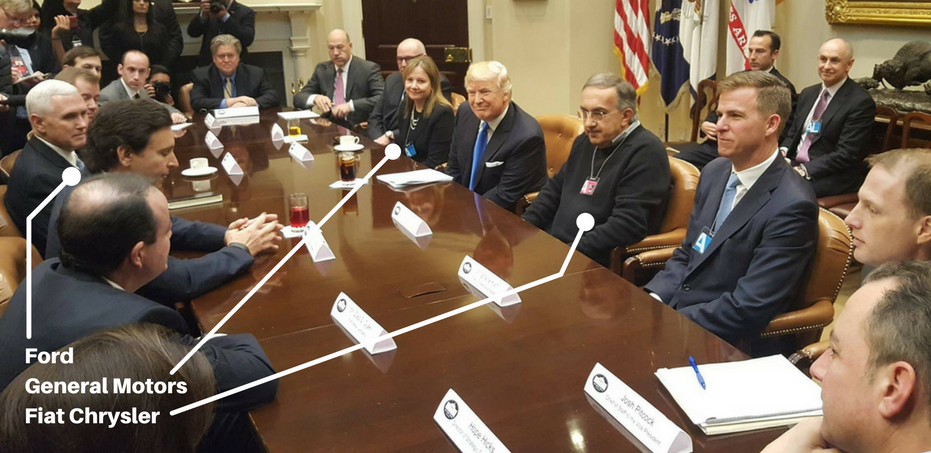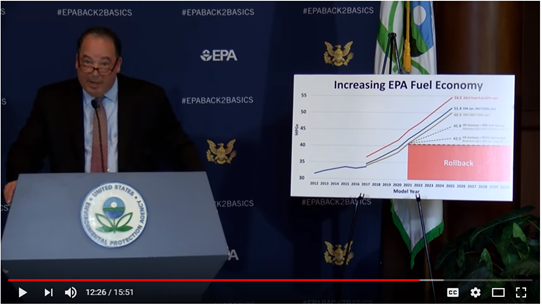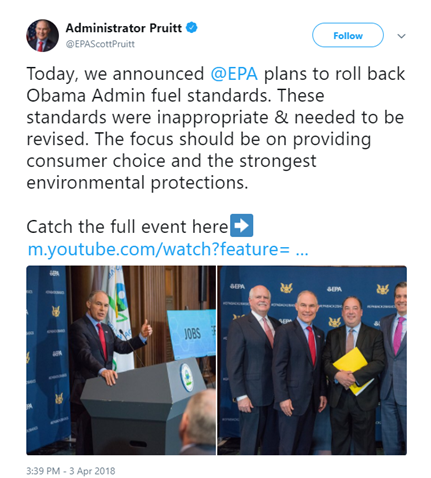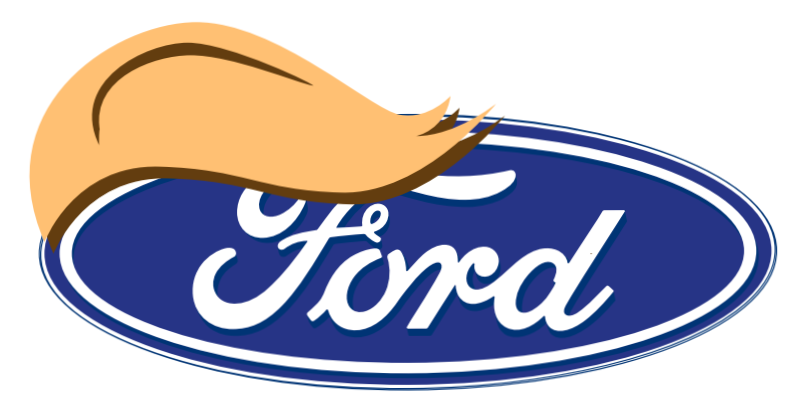Public Citizen Fact Check: Ford’s Big Deception
By Madeline Page
Facing backlash to EPA Administrator Scott Pruitt’s toxic agenda and unethical behavior, it’s no wonder automakers are rushing to distance themselves from Pruitt’s rollback of the popular clean car standards. But as major automakers like Ford scramble to hide behind green-tinged statements, now is the time to watch what they do — not what they say.

Shortly before the U.S. Environmental Protection Agency (EPA) announced its decision to roll back America’s clean car standards, Ford Motor Company issued a stunning statement: The company didn’t support a rollback, it claimed. Reporters gave the announcement wide coverage. But if you read between the lines, you can see that Ford is not breaking with other automakers; the company is just using carefully parsed wording to distract from what it is doing and leave a misleading impression.
Below we help decipher what Ford’s executives said in their statement, offer background on Ford and the Alliance of Automobile Manufacturers’ backward push on clean car standards and provide indicators that consumers can use to determine whether Ford truly supports the standards or is just giving them lip service.
Ford’s Green Washed Statement
Below are three of the most misleading parts in Ford’s statement, along with what the excerpts really mean and a fact check.
Ford says: “Currently, conversation is underway on setting the near-term standards for fuel economy. It is a critical one for all of us who care about the environment and our customers, and we all need to work together to ensure there is a win on both fronts.”
Translation: For Ford, a win means having wiggle room in the standards, which means automakers would not have to meet them as written.
Fact check: Clean car standards already are a win for consumers and the environment. According to the EPA’s 2017 Final Determination, Model Year (MY) 2022–2025 standards will cut 540 million metric tons of greenhouse gas emissions over the vehicle lifetimes and yield net benefits at the gas pump of nearly $100 billion. Standards force technology improvements, which lead to cleaner, more fuel-efficient vehicles. Without the standards, consumers lose and automakers can dump dirtier vehicles on the public. Ford asked for this “conversation” by lobbying the EPA to reopen the midterm review.
Ford says: “We support increasing clean car standards through 2025 and are not asking for a rollback. We want one set of standards nationally…
Translation: We want one set of different (weaker) national standards.
Fact Check: There already is one set of national standards, which were agreed upon by the Obama administration, the automakers and California. In 2017, the EPA reaffirmed those targets in tandem with California and 12 other states, which adopted them through 2025. In attempting to alter the agreement, the automakers are reneging on their commitment to the national program. Automakers also may refer to this as harmonization. This “flexibility” would increase carbon pollution and cost consumers more at the pump.
Ford Says (continued from above): “… along with additional flexibility to help us provide more affordable options for our customers.”
Translation: Additional flexibility means different standards, which means lower standards.
Fact Check: Some of the “flexibilities” that automakers have requested include: 1) calculating off-cycle credits retroactively; and 2) being able to increase credit swapping between cars and trucks. The first would allow automakers to bank credits for compliance from vehicles they have sold (rather than making continued fuel economy improvements). The second would allow automakers to raise the cap on credit trading between cars and trucks (so rather than ensuring fuel economy rises for both cars and trucks, this swapping would allow automakers stall/slow fuel economy for certain vehicles due to extra credit from others).
According to a Union of Concerned Scientists analysis of legislation (S. 1273 and H.R. 4011) that includes the loopholes described above as well as increases to the lifetime of Corporate Average Fuel Economy (CAFE) credits, these loopholes would lead to about “350 million barrels of additional oil being burned, 155 million metric tons of additional global warming emissions and $34 billion in additional fuel costs. The impact of this flexibility is significant in terms of pollution and fuel economy, and would not lead to customer affordability. “Flexibility” and rollbacks are the same thing.
When automakers say they want changes in clean car standards because they want “more affordable options for [their] customers,” be dubious. According to Consumers Union, because most buyers take out a loan to purchase a new vehicle, the cost of new technology is spread out over the length of the loan. Meanwhile they begin reaping net benefits from gas savings in the first month of ownership and onward.
Ford’s Push for Clean Cars Rollbacks

Despite what Ford says, we have evidence that it is working to undo the standards behind the scenes. How? Ford has exaggerated the cost of compliance with the law in interviews and has met with President Donald Trump and the EPA to request delays, weakened targets and threaten the ability of California and other states to set their own pollution standards.
- On January 24, 2017, Ford’s then-CEO Mark Fields pushed for flexibility in meeting the standards during a meeting between Trump and other Detroit automakers at the White House. Fields claimed that complying with the clean car standards would risk 1 million U.S. jobs, a cherry-picked figure from a dubious report.
- After the meeting, Fields “praised the new Administration” as he left the White House. And right after the same meeting, Trump pledged to make U.S. environmental regulations “extremely hospitable” to business. “We’re going to make a very short process. Generally speaking, we’re going to give you your permits. We’re going to be very friendly.”
- Then, on a January 27, 2017, earnings call, Fields said that the company’s talk “resonated” with Trump.
- On February 10, Ford and CEOs from 17 other automakers asked for the clean car standards to be reviewed, stating that the standards could “threaten future production levels, putting hundreds of thousands and perhaps as many as a million jobs at risk.”
- Ford was rewarded. On March 15, 2017, Fields, along with the CEOs of GM and Fiat-Chrysler, hosted Trump at an event in Michigan that provided a platform for the administration’s announcement that it would reopen the review of the clean car standards.
- On April 27, 2017 Ford met with EPA Administrator Scott Pruitt. In August 2017, the EPA reopened the clean car standards to review “with an eye to relax them.”
The Alliance of Automobile Manufacturers Does Ford’s Dirty Work
Ford is a member of the Alliance of Automobile Manufacturers (Auto Alliance), which, according to InfluenceMap, has “lobbied extensively to significantly weaken U.S. vehicle fuel economy standards.” If Ford truly believed the standards shouldn’t be rolled back, it wouldn’t be part of this group and would publicly distance itself from the group. Ford has done neither.
According to a report from InfluenceMap, the auto industry spent $49 million lobbying in 2017, the highest amount since 2008.
From the Auto Alliance’s website: “The Auto Alliance represents 12 iconic automakers — from the U.S., Europe and Japan — on a range of safety, environmental and technology issues before Congress, the Executive Branch and state legislatures. … The Auto Alliance, the leading advocacy group for the auto industry, represents 70% of all car and light truck sales in the United States, including the BMW Group, Fiat Chrysler Automobiles, Ford Motor Company, General Motors Company, Jaguar Land Rover, Mazda, Mercedes-Benz USA, Mitsubishi Motors, Porsche, Toyota, Volkswagen Group of America and Volvo Car USA.”
The Auto Alliance’s Partial Lobby Punch-List
- Nov. 10, 2016: the Auto Alliance asks President-elect Trump to reopen and “adjust” the settled clean car standards.
- Feb. 21, 2017: the Auto Alliance asks Pruitt to revoke the final determination for clean car standards.
- March 13, 2017: the Auto Alliance follows up the February request with a legal petition. (Two days later, the EPA complies).
- Sep. 6, 2017: In a public hearing on the EPA’s redetermination of the clean car standards, the Auto Alliance thanks the EPA for re-opening the midterm review and presses for modifications to the program.
- Oct. 24, 2017: According to Reuters, the Auto Alliance says “it would not stop trying to convince U.S. regulators to lower fuel efficiency mandates approved in the final weeks of the Obama administration.”
- Feb. 7, 2018: the Auto Alliance submits a chart of studies to NHTSA for consideration in rulemaking. The list includes dubious “scientific” data, which questions climate science and the link between tailpipe pollution. It was prepared by organizations and people with close industry associations and climate skeptics, and cites a study by Anthony Cox Jr. that was funded by the American Petroleum Institute.
The EPA’s revised final determination did not rely on any new agency analysis to demonstrate the need to reverse course on the agency’s own multi-year technical analysis, which in 2017 found that the clean car standards were appropriate. In this “new” determination, the EPA relied almost entirely on information from the auto industry, citing the Auto Alliance more than 40 times and not once mentioning the word “climate.”
Pruitt, Environmental and Consumer Advocates Agree! This Is a Rollback
The Auto Alliance’s president, Mitch Bainwol, was a speaker at Pruitt’s announcement of the redetermination of the clean car standards.
- Facing public outcry over the announcement, Bainwol said, “There’s a lot of talk about a rollback and in the press coverage and that description is wrong.”
- In his remarks, Bainwol included a jumbo graph (below) with his definition of rollback, asserting that adjustments to miles-per-gallon (mpg) targets below those required by the current clean car standards aren’t a rollback; only adjustments that would make mpg less than today’s average mpg should be considered a rollback. To be clear: anything that lowers the goal from the original deal is a rollback.

- Just after the event, Pruitt tweeted pictures from the announcement, including a group photo with him and Bainwol with the text, “Today, we announced @EPA plans to roll back Obama Admin fuel standards.” Someone should let the Auto Alliance know that Pruitt agrees with consumer advocates that the EPA’s decision is indeed a rollback.

While Ford and the Auto Alliance argue semantics all they want, consumers want improved fuel economy, not fewer protections. Weakening the clean car standards means consumers pay more money at the pump for cars that spew more dangerous pollution into our air and turns back the clock on important progress.
The Road Ahead
If automakers truly supported the clean car standards, they would:
- Publicly support CAFE targets and greenhouse gas standards agreed to by NHTSA/EPA/California Air Resources Board;
- Discontinue efforts to weaken or delay the standards under the guise of flexibility or otherwise;
- Disavow efforts by the Alliance of Automobile Manufacturers to promulgate anti-science studies and lobby efforts that would weaken or delay the standards; and
- Quit the alliance.
Given the grave consequences, consumers are watching these actions closely.
